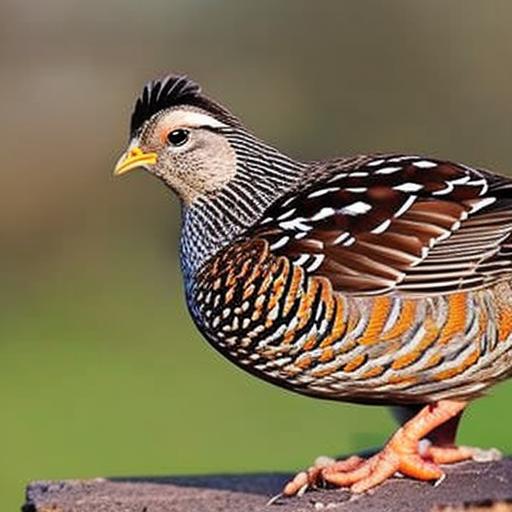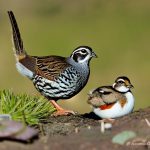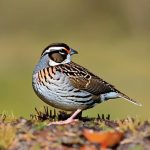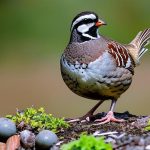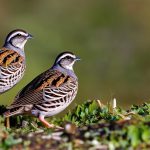When it comes to housing quails, it’s important to choose the right type of housing that will provide them with a safe and comfortable environment. There are several options to consider, including cages, hutches, and aviaries. Cages are a popular choice for quail housing, as they provide a secure and easily accessible environment for the birds. Hutches are another option, providing a more natural and spacious living space for quails. Aviaries are ideal for larger flocks of quails, offering plenty of room for the birds to move around and socialize.
Regardless of the type of housing you choose, it’s important to ensure that it is well-ventilated, secure, and provides protection from the elements. Additionally, the housing should be easy to clean and maintain, as this is essential for the health and well-being of the quails. When selecting housing for quails, it’s important to consider the size of the birds and the number of birds you plan to keep. Quails require a certain amount of space to move around and exercise, so it’s important to choose housing that will accommodate their needs. Additionally, the housing should be designed in a way that allows for easy access to food and water, as well as providing nesting areas for the birds to lay their eggs.
In conclusion, when choosing housing for quails, it’s important to consider the size of the birds, the number of birds you plan to keep, and the type of environment you want to create for them. Whether you choose cages, hutches, or aviaries, it’s essential to ensure that the housing is well-ventilated, secure, and provides protection from the elements. Additionally, the housing should be easy to clean and maintain, and should provide ample space for the birds to move around and exercise.
Key Takeaways
- Choose housing that provides at least 1 square foot of space per quail
- Use wire mesh or solid walls to protect quails from predators
- Install automatic feeders and waterers to ensure constant access to food and water
- Clean the housing regularly to prevent the buildup of waste and bacteria
- Use fans and vents to maintain proper airflow and temperature control
- Monitor quail health and behavior regularly and seek veterinary care as needed
- Provide perches, dust baths, and toys to keep quails mentally and physically stimulated
Providing adequate shelter and protection from predators
One of the most important aspects of quail housing is providing adequate shelter and protection from predators. Quails are small birds that are vulnerable to a wide range of predators, including cats, dogs, foxes, and birds of prey. It’s essential to ensure that their housing is secure and provides protection from these potential threats. This can be achieved by using sturdy materials such as wire mesh or solid wood to construct the housing, as well as ensuring that all openings are securely closed off to prevent predators from gaining access.
In addition to securing the housing itself, it’s also important to consider the surrounding environment. If possible, it’s best to place the quail housing in an area that is fenced off or otherwise protected from potential predators. This can help to further reduce the risk of predation and provide the quails with a safe and secure environment in which to live. Providing adequate shelter and protection from predators is essential for the health and well-being of quails. By taking steps to secure their housing and surrounding environment, you can help to ensure that they are safe from harm and able to thrive in their new home.
In conclusion, providing adequate shelter and protection from predators is essential when housing quails. This can be achieved by using sturdy materials to construct the housing, ensuring that all openings are securely closed off, and placing the housing in an area that is fenced off or otherwise protected from potential predators. By taking these steps, you can help to create a safe and secure environment for your quails to live in.
Creating a suitable feeding and watering system
Creating a suitable feeding and watering system is essential for ensuring the health and well-being of quails. Quails require a balanced diet that includes a mix of grains, seeds, greens, and protein sources such as insects or mealworms. It’s important to provide them with access to fresh food and water on a daily basis to ensure that their nutritional needs are met. When it comes to feeding quails, there are several options to consider. You can use feeders designed specifically for quails, or simply scatter their food on the ground to allow them to peck at it as they please.
In addition to providing a suitable feeding system, it’s also important to ensure that quails have access to clean and fresh water at all times. This can be achieved by using waterers designed specifically for quails, or by providing them with shallow dishes or trays filled with water. It’s important to regularly clean and refill their water containers to prevent contamination and ensure that they have access to clean water at all times. By creating a suitable feeding and watering system for your quails, you can help to ensure that they receive the nutrition they need to stay healthy and thrive.
In conclusion, creating a suitable feeding and watering system is essential for ensuring the health and well-being of quails. This can be achieved by providing them with access to fresh food on a daily basis, as well as clean and fresh water at all times. By taking these steps, you can help to ensure that your quails receive the nutrition they need to stay healthy and thrive.
Maintaining a clean and hygienic environment
Maintaining a clean and hygienic environment is essential for the health and well-being of quails. Quails are susceptible to a range of diseases and health issues if they are kept in unsanitary conditions. It’s important to regularly clean their housing, including removing soiled bedding, droppings, and any leftover food or water. This will help to prevent the build-up of bacteria and parasites that can pose a threat to the health of the birds.
In addition to cleaning their housing on a regular basis, it’s also important to provide them with clean bedding material such as straw or wood shavings. This will help to keep their living environment dry and comfortable, as well as reducing the risk of bacterial growth. It’s also important to regularly inspect their housing for any signs of damage or wear and tear, as this can provide entry points for pests or predators. By maintaining a clean and hygienic environment for your quails, you can help to ensure that they remain healthy and free from disease.
In conclusion, maintaining a clean and hygienic environment is essential for the health and well-being of quails. This can be achieved by regularly cleaning their housing, providing them with clean bedding material, and inspecting their environment for any signs of damage or wear and tear. By taking these steps, you can help to ensure that your quails remain healthy and free from disease.
Ensuring proper ventilation and temperature control
Ensuring proper ventilation and temperature control is essential for creating a comfortable living environment for quails. Quails are sensitive to temperature extremes and require a well-ventilated space that allows for air circulation while also maintaining a consistent temperature. It’s important to ensure that their housing provides adequate ventilation without exposing them to drafts or extreme temperatures.
In addition to ventilation, it’s also important to consider temperature control within their housing. This can be achieved by using insulation materials such as straw or wood shavings in their bedding, as well as providing them with access to shade during hot weather. In colder climates, it may be necessary to provide additional heating sources such as heat lamps or heated pads to keep them warm during winter months.
By ensuring proper ventilation and temperature control within their housing, you can help to create a comfortable living environment for your quails. This will help to reduce stress on the birds and promote overall health and well-being.
In conclusion, ensuring proper ventilation and temperature control is essential for creating a comfortable living environment for quails. This can be achieved by providing adequate ventilation without exposing them to drafts or extreme temperatures, as well as considering temperature control measures such as insulation materials and heating sources. By taking these steps, you can help to ensure that your quails remain comfortable and healthy in their living environment.
Implementing a regular health check and monitoring system

Implementing a regular health check and monitoring system is essential for ensuring the well-being of quails. It’s important to regularly inspect your birds for any signs of illness or injury, as well as monitoring their behavior and overall condition on a daily basis. This can help you identify any potential health issues early on and take appropriate action to address them.
In addition to regular health checks, it’s also important to monitor their food and water intake, as well as their egg production if applicable. Any changes in these areas could indicate potential health issues that need attention. It’s also important to keep an eye out for any signs of stress or aggression among your birds, as this could indicate issues within their social dynamics or living environment.
By implementing a regular health check and monitoring system for your quails, you can help to ensure that any potential health issues are identified early on and addressed promptly. This will help to promote overall health and well-being among your birds.
In conclusion, implementing a regular health check and monitoring system is essential for ensuring the well-being of quails. This can be achieved by regularly inspecting your birds for any signs of illness or injury, monitoring their behavior and overall condition on a daily basis, as well as keeping an eye on their food and water intake. By taking these steps, you can help to ensure that any potential health issues are identified early on and addressed promptly.
Providing enrichment and stimulation for quails
Providing enrichment and stimulation for quails is essential for promoting their mental and physical well-being. Quails are active birds that require mental stimulation in order to thrive in captivity. This can be achieved by providing them with access to natural materials such as branches or logs for perching, as well as toys or puzzles designed specifically for birds.
In addition to physical enrichment, it’s also important to consider social enrichment for your quails. Quails are social birds that thrive in groups, so it’s important to provide them with opportunities for social interaction within their flock. This can be achieved by ensuring that they have enough space within their housing to move around freely and interact with one another.
By providing enrichment and stimulation for your quails, you can help to promote their overall well-being and reduce stress within their living environment. This will help them lead happy and healthy lives in captivity.
In conclusion, providing enrichment and stimulation for quails is essential for promoting their mental and physical well-being. This can be achieved by providing them with access to natural materials for perching, as well as toys or puzzles designed specifically for birds. Additionally, it’s important to consider social enrichment by ensuring that they have enough space within their housing to move around freely and interact with one another. By taking these steps, you can help to promote overall well-being among your quails in captivity.
In conclusion
In conclusion, there are several key factors to consider when housing quails in captivity. It’s important to choose the right type of housing that provides a safe and comfortable environment for the birds while also ensuring adequate shelter and protection from predators. Creating a suitable feeding and watering system is essential for meeting their nutritional needs while maintaining a clean and hygienic environment is crucial for preventing disease.
Ensuring proper ventilation and temperature control within their housing is essential for creating a comfortable living environment while implementing a regular health check and monitoring system is crucial for identifying any potential health issues early on. Finally, providing enrichment and stimulation for quails is essential for promoting their mental and physical well-being in captivity.
By taking these factors into consideration when housing quails in captivity, you can help ensure that they lead happy and healthy lives in their new home.
If you’re considering keeping quails outside, you may also be interested in learning about the benefits of renting a chicken coop. Poultry Wizard’s article on renting a chicken coop provides valuable insights into this convenient option for poultry enthusiasts. It’s a great way to explore the world of backyard poultry without the commitment of building or maintaining a coop.
FAQs
What are the benefits of keeping quails outside?
Quails are well-suited to outdoor environments and keeping them outside allows them to exhibit natural behaviors such as dust bathing and foraging. It also provides them with access to natural sunlight and fresh air, which can contribute to their overall health and well-being.
What type of housing is suitable for keeping quails outside?
A suitable housing for quails outside should provide protection from predators, such as secure fencing or a predator-proof coop. It should also offer shelter from the elements, such as a roof or cover to protect them from rain and direct sunlight. Additionally, the housing should have adequate space for the quails to move around and access to clean water and food.
What should be considered when setting up an outdoor space for quails?
When setting up an outdoor space for quails, it’s important to consider the location, ensuring it is well-drained and not prone to flooding. Providing adequate shade and protection from extreme weather conditions is also crucial. Additionally, the outdoor space should be secure to prevent escapes and protect the quails from predators.
How can quails be protected from predators when kept outside?
To protect quails from predators when kept outside, it’s important to use secure fencing or a predator-proof coop to prevent access from animals such as raccoons, foxes, and birds of prey. Additionally, using motion-activated lights or sound devices can help deter predators from approaching the quail’s outdoor space.
What should be included in the diet of quails kept outside?
The diet of quails kept outside should include a balanced commercial quail feed, supplemented with fresh greens, insects, and grit for digestion. Access to clean water should also be provided at all times. It’s important to ensure that the quails have access to a varied diet to meet their nutritional needs.
Meet Walter, the feathered-friend fanatic of Florida! Nestled in the sunshine state, Walter struts through life with his feathered companions, clucking his way to happiness. With a coop that’s fancier than a five-star hotel, he’s the Don Juan of the chicken world. When he’s not teaching his hens to do the cha-cha, you’ll find him in a heated debate with his prized rooster, Sir Clucks-a-Lot. Walter’s poultry passion is no yolk; he’s the sunny-side-up guy you never knew you needed in your flock of friends!

